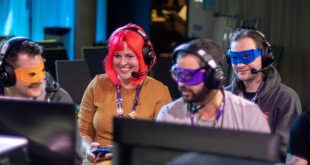Every month, we discuss the unique process of making music for video games. This month, we dive into the musical universe of Winifred Phillips, who’s behind the soundtracks of the Assassin’s Creed 3: Liberation, The Sims, LittleBigPlanet 3 and more
How early in a game’s development process do you usually start working on the score?
That can vary, depending on the workflow and management style of the development team. For a really large scale project like LittleBigPlanet 3, I’m brought into the development team early on, and my collaboration with the sound designers and audio directors lasts for years. For other projects, such as Total War Battles: Kingdom, I’m hired more towards the end of development when everything about the game is nearly complete, and those kinds of projects can take a year or less. For projects developed by indie teams, I might have a few months, or even a few weeks.
What type of material do you request from a studio before starting to write the score?
I try to request everything that the development team might be willing to share. Game design documents are helpful, as they can provide lots of insight and inspiration. Concept art and screen shots can greatly assist in defining the emotional mood and character of the project. Of course, gameplay videos are essential, and I always request those. For some projects, I’ve also received early builds of the game, but unfortunately that isn’t always possible.
What are the typical challenges of writing for games as opposed to more linear narrative forms?
Since the action of a game is dependent on the player’s choices, events play out in unpredictable ways. The music can’t be composed in a traditional, linear fashion. Instead, it needs to be able to adapt to changing circumstances. Composing music for games usually involves the creation of modular musical components that are fitted together by the game engine as play progresses, according to how things are going. For a composer trained in traditional musical composition, the transition to composing for an interactive medium can be daunting. The discipline of video game composition is a much more technical and time-consuming process than composing for television or films.
Does your approach differ between writing for a big triple-A title vs indie games?
Not at all. I approach every game project with the same enthusiasm and focus. In my experience, there’s no typical musical style or scope to be associated with an indie game versus a triple-A title. I created light-hearted and whimsical music for the triple-A Sims franchise from EA, and brooding orchestral music for the Shattered State VR project from the Supermassive Games indie studio. For me, the size of the game and the development team makes no difference in terms of the creative approach I take.
How free are you to experiment when you take on a mandate from a studio?
That depends on the team. For instance, when I was hired to compose the music of Assassin’s Creed: Liberation, the team at Ubisoft allowed me a lot of freedom to make creative choices. On the other hand, working as a composer on the original God of War meant that I needed to shape my musical creations to fit in with the other compositions being created by the rest of the composer team. In that case, there was a specific style to which the entire team adhered, although there certainly was room to be creative within those boundaries.
Do you feel like game soundtracks get the same recognition as film scores? If not, why this difference?
Back when I started as a game composer, there was certainly a difference in the respect afforded to mediums such as film and television as compared to the way in which game music was regarded. When you consider that game music originally began in the ‘bleeps-and-bloops’ era, it’s definitely understandable that people might have a misguided impression of what game music is. But now, things have been rapidly changing for the better. Game music now enjoys a loyal and enthusiastic fanbase, and those fans support game music by buying albums and going to live orchestral concerts performances. My own music from the Assassin’s Creed franchise will be a part of an upcoming concert tour, so I’m definitely really looking forward to that.

 MCV/DEVELOP News, events, research and jobs from the games industry
MCV/DEVELOP News, events, research and jobs from the games industry




